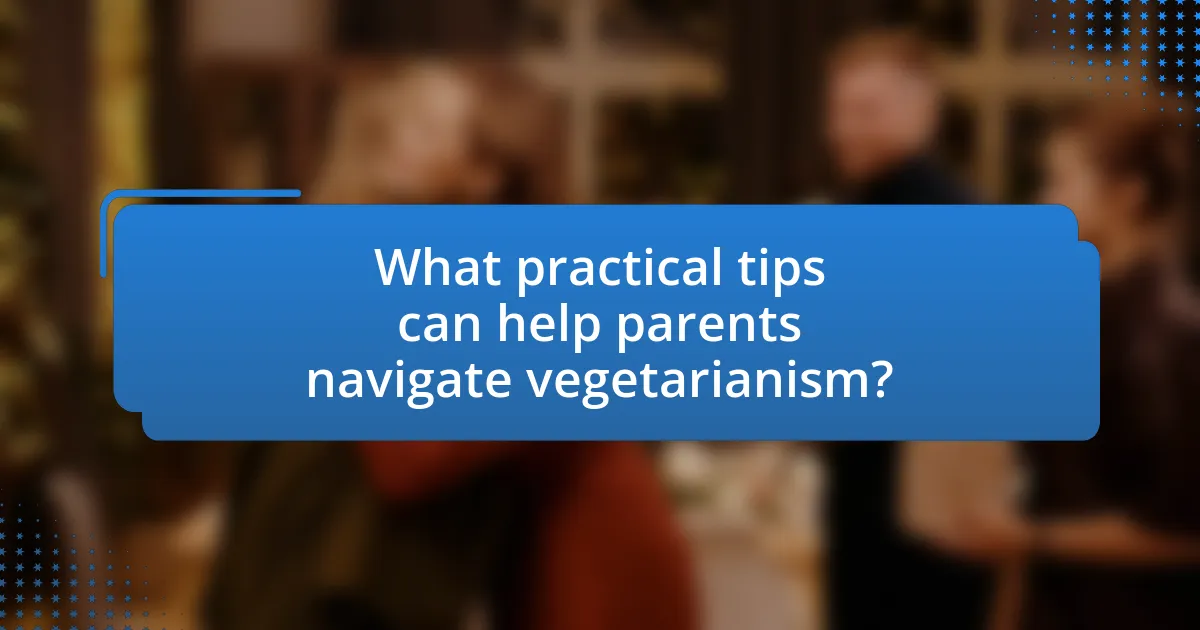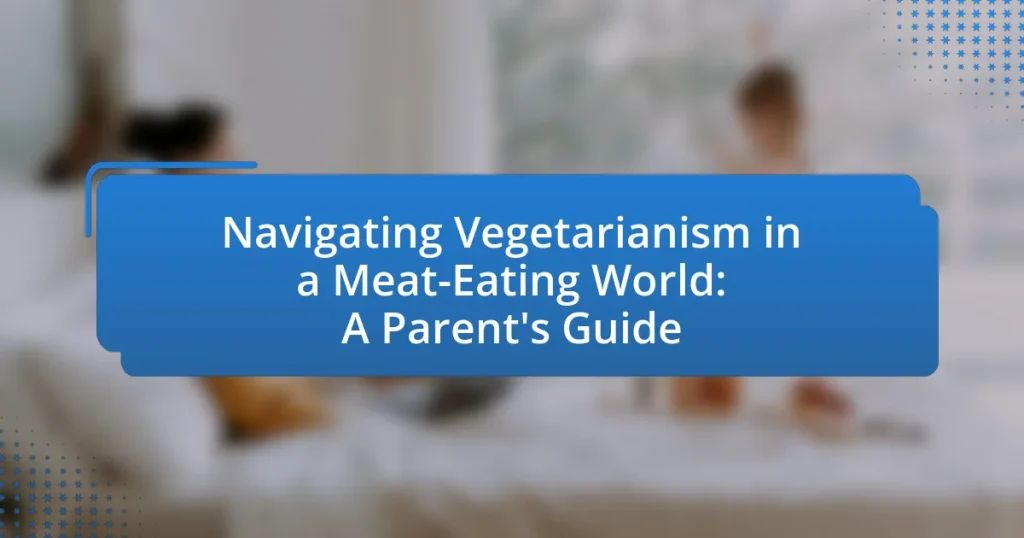The article “Navigating Vegetarianism in a Meat-Eating World: A Parent’s Guide” provides a comprehensive overview of the challenges and strategies associated with raising vegetarian children in a predominantly meat-centric society. It addresses the nutritional needs of vegetarian children, the importance of meal planning, and the social dynamics that vegetarian families may encounter. Key topics include how to introduce vegetarianism to children, ways to cope with peer pressure, and practical tips for ensuring a balanced diet. Additionally, the article highlights resources available for vegetarian families and discusses common misconceptions about vegetarianism, emphasizing the health, environmental, and ethical benefits of this lifestyle choice.

What does it mean to be a vegetarian in a meat-eating world?
Being a vegetarian in a meat-eating world means choosing to abstain from consuming meat while navigating social, cultural, and dietary challenges. This lifestyle often requires individuals to seek alternative sources of protein and nutrients, such as legumes, nuts, and dairy products, to maintain a balanced diet. According to the Vegetarian Resource Group, approximately 3% of the U.S. population identifies as vegetarian, highlighting the minority status of vegetarians in a predominantly meat-centric society. This choice can lead to social situations where vegetarians may face pressure or misunderstanding from peers, necessitating strong personal conviction and advocacy for their dietary preferences.
How can parents introduce vegetarianism to their children?
Parents can introduce vegetarianism to their children by gradually incorporating plant-based meals into their diets and involving them in the meal preparation process. This approach allows children to explore new flavors and textures while fostering a sense of ownership over their food choices. Research indicates that children are more likely to accept new foods when they participate in cooking, as it enhances their interest and willingness to try different dishes. Additionally, providing educational resources about the benefits of vegetarianism, such as improved health and environmental impact, can further encourage children to embrace this lifestyle.
What are the key reasons families choose vegetarianism?
Families choose vegetarianism primarily for health, environmental, and ethical reasons. Health concerns often drive families to adopt a vegetarian diet, as studies indicate that plant-based diets can reduce the risk of chronic diseases such as heart disease, diabetes, and certain cancers. Environmental factors also play a significant role; research shows that livestock farming contributes to greenhouse gas emissions, deforestation, and water depletion, prompting families to seek more sustainable food choices. Additionally, ethical considerations regarding animal welfare influence families, as many are concerned about the treatment of animals in the meat industry. These key reasons reflect a growing trend towards vegetarianism among families seeking healthier lifestyles, environmental sustainability, and ethical eating practices.
How can parents address children’s concerns about vegetarianism?
Parents can address children’s concerns about vegetarianism by engaging in open discussions that validate their feelings and provide accurate information. By explaining the health benefits of a vegetarian diet, such as lower risks of heart disease and obesity, parents can help children understand the positive aspects of this lifestyle choice. Research from the American Dietetic Association indicates that well-planned vegetarian diets are nutritionally adequate and can provide health benefits in the prevention and treatment of certain diseases. Additionally, parents can involve children in meal planning and preparation, allowing them to explore vegetarian options and understand the variety of foods available. This hands-on approach can alleviate concerns and foster a positive attitude towards vegetarianism.
What challenges do vegetarian families face in a meat-centric society?
Vegetarian families face significant challenges in a meat-centric society, primarily including social stigma, limited food options, and difficulties in meal planning. Social stigma manifests as negative perceptions or judgments from peers and family members, which can lead to feelings of isolation. Limited food options arise in restaurants and social gatherings, where vegetarian choices may be scarce or unappealing, making it hard for families to find suitable meals. Additionally, meal planning becomes complex as vegetarian families must navigate ingredient availability and ensure nutritional adequacy, often requiring more time and effort compared to their meat-eating counterparts. These challenges highlight the need for increased awareness and accommodation of diverse dietary preferences in society.
How can parents navigate social situations involving meat?
Parents can navigate social situations involving meat by preparing alternative meal options and communicating dietary preferences in advance. This proactive approach ensures that children who follow a vegetarian diet have suitable food choices available, reducing potential discomfort or exclusion during gatherings. Research indicates that clear communication about dietary needs can foster understanding and support from hosts, making it easier for families to participate in social events without compromising their values or health.
What strategies can help children cope with peer pressure regarding food choices?
Children can cope with peer pressure regarding food choices by developing strong communication skills and self-confidence. Encouraging children to express their food preferences clearly helps them articulate their choices to peers. Role-playing scenarios can prepare them for real-life situations, allowing them to practice responses to peer pressure. Additionally, educating children about nutrition and the reasons behind their dietary choices fosters a sense of ownership and pride in their decisions. Research indicates that children who understand the health benefits of their food choices are more likely to resist peer pressure (Contento, I. R. et al., 2010, “Nutrition Education: A Key to Healthy Eating”). Furthermore, involving children in meal planning and preparation can enhance their commitment to their dietary choices, making them less susceptible to external influences.
Why is it important to educate children about nutrition as vegetarians?
Educating children about nutrition as vegetarians is crucial to ensure they receive balanced and adequate nutrients necessary for their growth and development. Vegetarian diets can lack essential nutrients such as protein, iron, calcium, and vitamin B12, which are vital for children’s health. Research indicates that children on vegetarian diets may be at risk for deficiencies if not properly educated about food choices; for instance, a study published in the Journal of the American Dietetic Association highlights that vegetarian children need to be guided to include diverse sources of these nutrients, such as legumes, nuts, seeds, and fortified foods. By educating children on nutrition, parents can help them make informed dietary choices that support their health while adhering to vegetarian principles.
What essential nutrients should vegetarian children focus on?
Vegetarian children should focus on essential nutrients such as protein, iron, calcium, vitamin B12, vitamin D, omega-3 fatty acids, and zinc. These nutrients are crucial for growth, development, and overall health. For instance, protein can be obtained from legumes, nuts, and dairy products, while iron is found in lentils and fortified cereals. Calcium is vital for bone health and can be sourced from dairy or fortified plant-based alternatives. Vitamin B12, primarily found in animal products, may require supplementation or fortified foods for vegetarian children. Vitamin D, important for calcium absorption, can be obtained from sunlight exposure and fortified foods. Omega-3 fatty acids, essential for brain development, can be sourced from flaxseeds and walnuts. Lastly, zinc is important for immune function and can be found in beans, nuts, and whole grains.
How can parents ensure their children receive a balanced vegetarian diet?
Parents can ensure their children receive a balanced vegetarian diet by incorporating a variety of plant-based foods that provide essential nutrients. This includes a mix of fruits, vegetables, whole grains, legumes, nuts, and seeds to cover protein, iron, calcium, and vitamins B12 and D. For instance, legumes like lentils and chickpeas are excellent protein sources, while fortified plant milks can supply calcium and vitamin D. Research indicates that a well-planned vegetarian diet can meet the nutritional needs of children, as supported by the American Dietetic Association, which states that appropriately planned vegetarian diets are healthful and nutritionally adequate for all stages of life.

How can parents effectively support their vegetarian children?
Parents can effectively support their vegetarian children by ensuring they receive balanced nutrition and fostering a positive environment around their dietary choices. This involves educating themselves about vegetarian nutrition, including essential nutrients like protein, iron, calcium, and vitamin B12, which are crucial for growth and development. Research indicates that a well-planned vegetarian diet can meet the nutritional needs of children, as supported by the American Dietetic Association, which states that appropriately planned vegetarian diets are healthful and nutritionally adequate. Additionally, parents should involve their children in meal planning and preparation, encouraging them to explore diverse vegetarian foods, which can enhance their interest and commitment to the diet.
What role does meal planning play in a vegetarian household?
Meal planning plays a crucial role in a vegetarian household by ensuring balanced nutrition and variety in meals. It helps families systematically incorporate essential nutrients such as protein, iron, and vitamins B12 and D, which are often less abundant in vegetarian diets. Research indicates that meal planning can lead to healthier eating habits, as it encourages the inclusion of diverse plant-based foods, thereby reducing the likelihood of nutrient deficiencies. Additionally, effective meal planning can minimize food waste and save time and money, making it a practical approach for vegetarian families navigating dietary choices in a predominantly meat-eating environment.
How can parents create a diverse vegetarian meal plan?
Parents can create a diverse vegetarian meal plan by incorporating a variety of fruits, vegetables, whole grains, legumes, nuts, and seeds into their meals. This approach ensures a balanced intake of essential nutrients while offering a wide range of flavors and textures. For instance, including different types of beans, lentils, and chickpeas can provide protein and fiber, while a mix of colorful vegetables can enhance vitamins and minerals. Research indicates that a diverse diet can improve overall health and reduce the risk of chronic diseases, making it crucial for parents to explore various cuisines and cooking methods to keep meals interesting and nutritious.
What are some easy vegetarian recipes for families?
Easy vegetarian recipes for families include vegetable stir-fry, lentil soup, and pasta primavera. Vegetable stir-fry can be made by sautéing a mix of bell peppers, broccoli, and carrots in soy sauce and garlic, providing a quick and nutritious meal. Lentil soup, rich in protein and fiber, can be prepared by simmering lentils with diced tomatoes, onions, and spices for about 30 minutes. Pasta primavera involves cooking pasta and tossing it with seasonal vegetables like zucchini, cherry tomatoes, and spinach, finished with olive oil and Parmesan cheese. These recipes are not only simple but also cater to diverse tastes, making them suitable for family meals.
How can parents foster a positive attitude towards vegetarianism?
Parents can foster a positive attitude towards vegetarianism by actively involving their children in meal planning and preparation. Engaging children in choosing vegetarian recipes and cooking together can enhance their interest and acceptance of plant-based foods. Research indicates that children who participate in food-related activities are more likely to try new foods and develop healthier eating habits. Additionally, discussing the environmental, health, and ethical benefits of vegetarianism can help children understand its importance, making them more open to adopting this lifestyle.
What activities can engage children in vegetarian cooking?
Engaging children in vegetarian cooking can be achieved through activities such as hands-on meal preparation, gardening, and food-themed games. Hands-on meal preparation allows children to actively participate in chopping vegetables, mixing ingredients, and assembling dishes, which enhances their cooking skills and fosters a sense of accomplishment. Gardening activities, where children grow their own vegetables, teach them about plant life cycles and the importance of fresh produce in a vegetarian diet. Food-themed games, such as cooking competitions or trivia about vegetarian ingredients, can make learning fun and interactive, reinforcing their knowledge about healthy eating. These activities not only promote culinary skills but also encourage a positive attitude towards vegetarianism.
How can parents encourage children to explore new vegetarian foods?
Parents can encourage children to explore new vegetarian foods by involving them in meal planning and preparation. Engaging children in selecting recipes and cooking fosters curiosity and ownership over their food choices. Research indicates that children are more likely to try new foods when they have a role in the cooking process, as it increases their interest and willingness to taste different ingredients. Additionally, introducing a variety of colorful vegetables and plant-based proteins in fun and appealing ways can enhance their willingness to experiment with vegetarian options.
What resources are available for vegetarian families?
Vegetarian families can access a variety of resources including cookbooks, online recipe databases, community support groups, and educational websites. Cookbooks such as “Plenty” by Yotam Ottolenghi provide diverse vegetarian recipes, while websites like Forks Over Knives offer extensive meal plans and cooking tips. Community support groups, often found on social media platforms, allow families to share experiences and recipes. Educational websites like the Vegetarian Resource Group provide information on nutrition and meal planning, ensuring families can maintain a balanced diet. These resources collectively support vegetarian families in meal preparation and lifestyle choices.
How can parents find community support for vegetarianism?
Parents can find community support for vegetarianism by joining local vegetarian or vegan groups, participating in online forums, and attending plant-based cooking classes. Local vegetarian organizations often host events, provide resources, and connect families with similar dietary choices, fostering a supportive environment. Online platforms like social media groups and forums allow parents to share experiences, recipes, and advice, creating a virtual community. Additionally, cooking classes focused on vegetarian cuisine can offer practical skills while connecting parents with others who share their dietary values.
What books or websites can help educate families about vegetarianism?
Books such as “The Vegetarian Family Cookbook” by Tami H. K. and “Plant-Powered Families” by Dreena Burton provide comprehensive recipes and insights for families transitioning to vegetarianism. Websites like Vegetarian Times and the American Dietetic Association offer valuable resources, articles, and guidelines on vegetarian nutrition and meal planning. These sources are recognized for their educational content, making them effective tools for families seeking to understand vegetarianism.

What practical tips can help parents navigate vegetarianism?
To help parents navigate vegetarianism, it is essential to focus on meal planning, education, and community support. Meal planning allows parents to create balanced diets that include a variety of plant-based proteins, whole grains, fruits, and vegetables, ensuring nutritional adequacy. Educating children about the benefits of vegetarianism, including health and environmental impacts, fosters understanding and acceptance. Additionally, connecting with local vegetarian or vegan communities can provide resources, recipes, and social support, making the transition smoother. Research indicates that children who are involved in meal preparation are more likely to try new foods, enhancing their dietary variety and acceptance of vegetarian meals.
How can parents handle dining out as a vegetarian family?
Parents can handle dining out as a vegetarian family by researching restaurants in advance to ensure they offer suitable vegetarian options. Many establishments now provide dedicated vegetarian menus or clearly mark vegetarian dishes, making it easier for families to choose. Additionally, parents can communicate dietary preferences when making reservations or upon arrival, which can lead to better service and customized meal options. According to a 2021 survey by the Vegetarian Resource Group, 39% of adults in the U.S. identify as vegetarian or vegan at least occasionally, indicating a growing trend in restaurant offerings that cater to plant-based diets. This trend supports the idea that dining out as a vegetarian family is increasingly feasible and enjoyable.
What should parents look for in vegetarian-friendly restaurants?
Parents should look for a diverse menu that offers a variety of vegetarian options in vegetarian-friendly restaurants. A well-rounded selection ensures that children can enjoy different flavors and nutrients, which is essential for a balanced diet. Additionally, parents should check for clear labeling of vegetarian and vegan dishes, as this helps in making informed choices. Restaurants that prioritize fresh, locally sourced ingredients often provide healthier and tastier meals, which is beneficial for children’s overall well-being. Furthermore, establishments that accommodate dietary restrictions, such as gluten-free or nut-free options, demonstrate a commitment to inclusivity and safety for all diners.
How can parents communicate dietary preferences when dining out?
Parents can communicate dietary preferences when dining out by clearly stating their needs to the restaurant staff. This can be done by specifying dietary restrictions, such as vegetarian or vegan options, and asking for modifications to existing menu items. Research indicates that effective communication with restaurant personnel can lead to better dining experiences, as staff are often willing to accommodate specific requests when they are clearly articulated. For instance, a study published in the Journal of Culinary Science & Technology highlights that clear communication improves customer satisfaction and ensures dietary needs are met.
What are some common misconceptions about vegetarianism?
Common misconceptions about vegetarianism include the belief that it is nutritionally inadequate, that vegetarians cannot get enough protein, and that vegetarian diets are expensive. Research indicates that a well-planned vegetarian diet can provide all necessary nutrients, including protein, iron, and calcium, as evidenced by the Academy of Nutrition and Dietetics, which states that appropriately planned vegetarian diets are healthful, nutritionally adequate, and may provide health benefits in the prevention and treatment of certain diseases. Additionally, many plant-based protein sources, such as legumes, nuts, and whole grains, are cost-effective, debunking the myth that vegetarianism is inherently more expensive than meat-based diets.
How can parents address myths about vegetarian diets?
Parents can address myths about vegetarian diets by educating themselves and their children on the nutritional adequacy of plant-based diets. Research indicates that well-planned vegetarian diets can provide all necessary nutrients for growth and development, as supported by the American Dietetic Association, which states that vegetarian diets are healthful, nutritionally adequate, and may provide health benefits in the prevention and treatment of certain diseases. Parents can also share factual information from credible sources, such as the Academy of Nutrition and Dietetics, which emphasizes that vegetarian diets can meet the dietary needs of individuals at all life stages, including children. Engaging in open discussions about the benefits and misconceptions surrounding vegetarianism can further help dispel myths and promote understanding.
What facts can help clarify the benefits of vegetarianism?
Vegetarianism offers numerous health benefits, including a lower risk of chronic diseases such as heart disease, diabetes, and certain cancers. Research published in the Journal of the American Heart Association indicates that vegetarian diets are associated with a 32% lower risk of heart disease compared to non-vegetarian diets. Additionally, a study in the American Journal of Clinical Nutrition found that vegetarians tend to have lower body mass indexes (BMIs) and better cholesterol levels, contributing to overall improved health outcomes. Furthermore, vegetarian diets are often rich in essential nutrients, including fiber, vitamins, and antioxidants, which support better digestion and immune function.
What are the best practices for raising vegetarian children?
The best practices for raising vegetarian children include ensuring a balanced diet, educating them about nutrition, involving them in meal planning, and fostering a positive attitude towards vegetarianism. A balanced diet should include a variety of fruits, vegetables, whole grains, legumes, nuts, and seeds to meet their nutritional needs, as children require adequate protein, iron, calcium, and vitamins B12 and D for growth and development. Educating children about nutrition helps them understand the importance of their dietary choices, which can lead to healthier eating habits. Involving children in meal planning and preparation encourages them to try new foods and develop cooking skills. Lastly, fostering a positive attitude towards vegetarianism can be achieved by discussing ethical, environmental, and health reasons for their dietary choices, which can help them feel confident and proud of their lifestyle.
How can parents encourage healthy eating habits in vegetarian children?
Parents can encourage healthy eating habits in vegetarian children by providing a variety of nutrient-dense vegetarian foods and involving them in meal planning and preparation. Research indicates that children are more likely to adopt healthy eating behaviors when they have a say in their food choices and are engaged in cooking, which fosters a positive relationship with food. Additionally, parents should educate their children about the nutritional benefits of vegetarian foods, such as legumes, whole grains, fruits, and vegetables, to ensure they receive essential nutrients like protein, iron, and vitamins. Studies show that children who understand the health implications of their dietary choices are more likely to make informed decisions about their eating habits.
What tips can help families transition to a vegetarian lifestyle smoothly?
To help families transition to a vegetarian lifestyle smoothly, it is essential to gradually introduce plant-based meals while involving all family members in the process. This approach fosters acceptance and enthusiasm for new foods. Research indicates that gradual changes are more sustainable; for instance, a study published in the Journal of Nutrition Education and Behavior found that families who made incremental dietary changes were more likely to maintain those changes over time. Additionally, planning meals together, exploring vegetarian recipes, and ensuring a variety of flavors and textures can enhance the experience and make it enjoyable for everyone involved.


